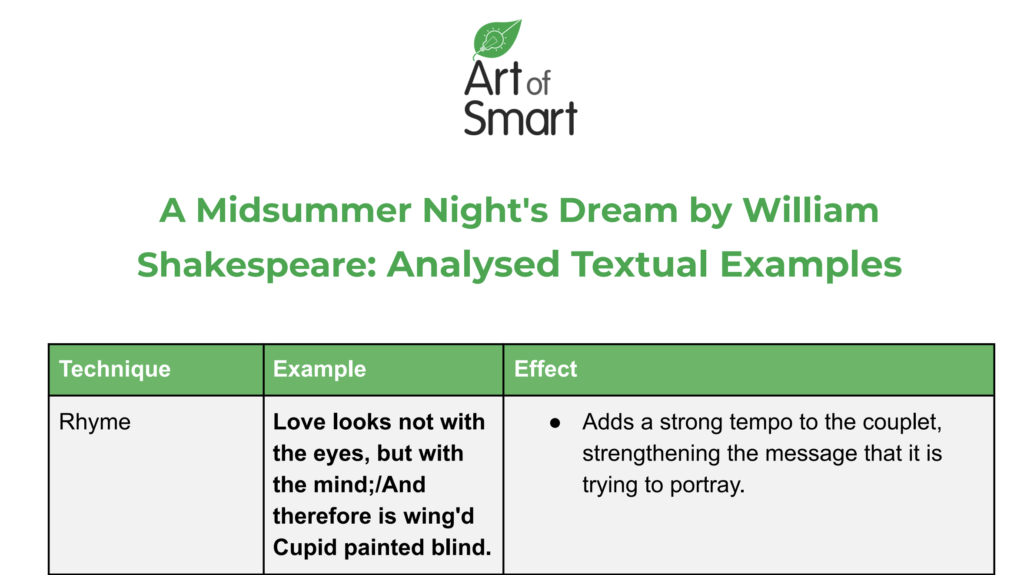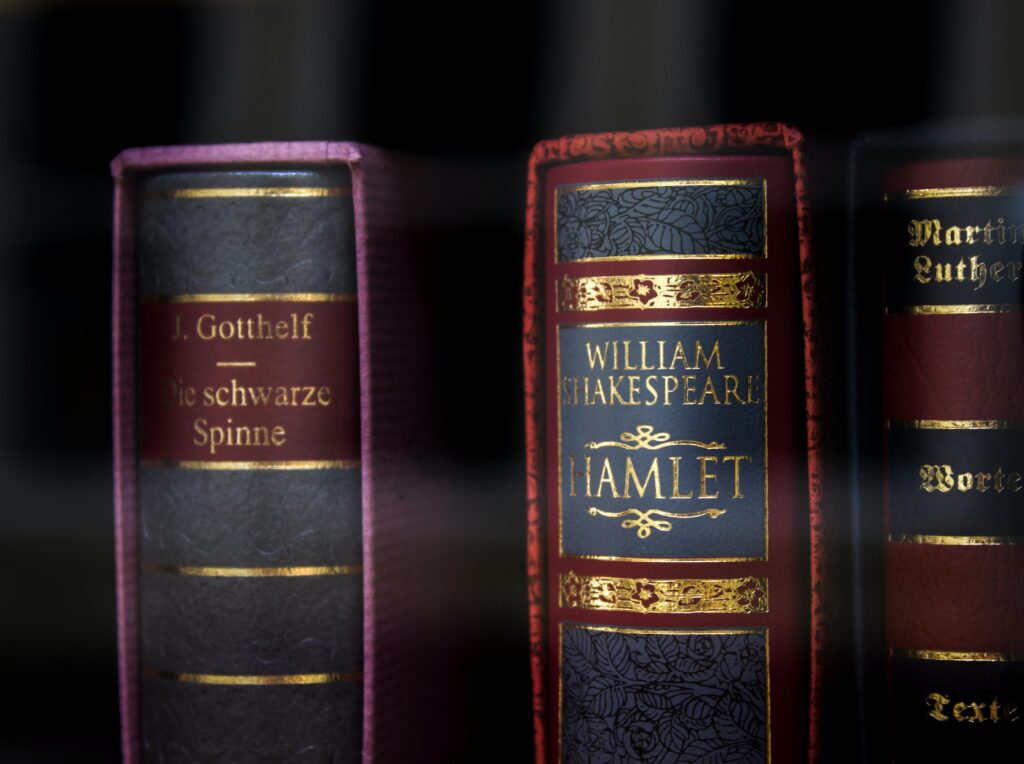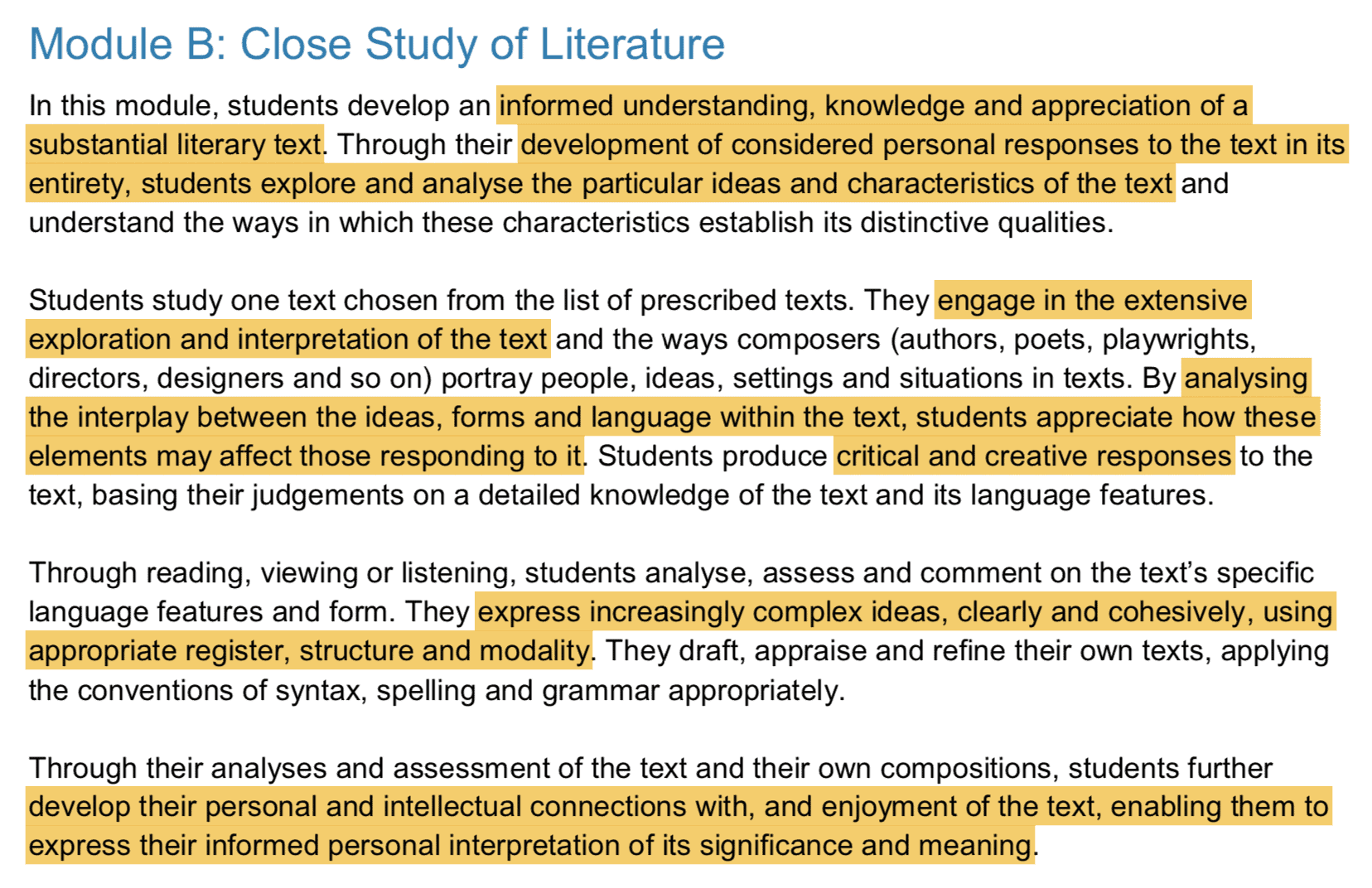Are you studying ‘A Midsummer Night’s Dream’ by William Shakespeare for English Standard Module B? Are you wondering which themes you should be thinking about, how you should be analysing the text and how everything links to your module? Lucky you found this article because we are about to discuss just that!
PLUS if you continue reading, we’ll provide you with a TEE table and a sample paragraph so you can see what a high level response looks like!
Let’s get started!
A Midsummer Night’s Dream by William Shakespeare Summary
Key Characters in A Midsummer Night’s Dream
Context
Themes Explored in A Midsummer Night’s Dream
Studying A Midsummer Night’s Dream for HSC
Essay Analysis of A Midsummer Night’s Dream
A Midsummer Night’s Dream by William Shakespeare Summary
A Midsummer Night’s Dream is a Shakespearean comedy written by, you guessed it – Shakespeare, around 1595-96.
The drama, set in Athens, features multiple story lines centring around four Athenian lovers and including stories involving fairies, a play-within-a-play and a wedding!
Act I
The play starts off with an introduction to Theseus and Hippolyta, who are preparing for their wedding. Athens is an image of civilised society — until the events of play ensues.
An angry Egeus enters the scene, lamenting his fury with his daughter Hermia who does not want to marry Demetrius as told so by her father. The scene ends with Hermia and Lysander planning to run away together.
The second scene of Act I features one of the subplots of the play in which some local craftsmen plan to put on a play – ‘Pyramus and Thisby’ for Theseus and Hippolyta on their wedding day.
Act II
In Act 2 Scene 1, we are introduced to the ‘fairy world’. A clear rift is seen between Oberon and Titania – the King and Queen of the fairies, which Oberon plans to fix by asking his servant Puck to put lovejuice on Titania’s eyes.
After witnessing the plight of a miserable Helena, Oberon asks Puck to put lovejuice on Demetrius’s eyes too so that he would love Helena.
Puck does as he is told and places lovejuice on Titania’s eyes in Act 2 Scene 2.
However, Puck he mistakes Lysander for Demetrius, putting the love potion into his eyes instead. At that moment, Helena comes into the scene, waking Lysander up, making him fall in love with her.
Act III
We are taken back to the rehearsals of the play by the town craftsmen in Act 3 Scene 1. Puck stumbles upon preparations, and turns Nick Bottom’s head into one of a donkey. Titania wakes to see Bottom, falling in love with him instantly.
Act 3 Scene 2 begins. Things start getting heated as Puck tried to fix his previous mistake. He puts the lovejuice into Demetrius’s eyes, making him fall in love with Helena.
Now, Lysander and Demetrius love Helena, no one loves Hermia and Helena becomes angry with all three of the other characters as she thinks they are merely playing a wicked game on her.
Oberon orders Puck to fix the mess he’s made by putting the antidote to the love potion into Lysander’s eyes.
Act IV
In Act 4 Scene 1, Oberon arrives, giving Titania the antidote to the lovejuice potion.
Theseus, Hippolyta and Egeus find the four Athenian lovers asleep in the middle of the woods.
We return to a dialogue between the craftsmen in the short Act 4 Scene 2, who discuss the play they will be performing for Theseus and Hippolyta.
Act V
The play finishes off with Theseus and Hippolyta’s wedding and an epilogue by Puck!
Key Characters in A Midsummer Night’s Dream
There are quite a few key characters in the play who serve to drive the plot and reveal interesting aspects of the key themes that we just discussed! These characters include:
Puck
The mischievous fairy or hobgoblin who is the main driver of the plot. He is loyal to King Oberon, whose main job is to “jest to Oberon, and make him smile.”
He carries out the King’s orders to help the mortal lovers (ironically, causing a lot of chaos!).
Oberon
The King of the Fairies.
Titania
The Queen of the Fairies.
Demetrius
In love with Hermia (at first) but then falls in love with Helena.
Lysander
In love with Hermia.
Helena
In love with Demetrius.
Hermia
In love with Lysander, childhood friend’s with Helena and Egeus’s daughter.
Hermia is also quick-tempered woman who is jealous of Helena’s beauty.
Hippolyta
Queen of the Amazons, engaged to Theseus.
Theseus
Duke of Athens. In Greek Mythology, Theseus killed many monsters — most notably the Minotaur in Crete.
Egeus
Hermia’s father.
Nick Bottom
An actor in the play that the workers are creating for Hippolyta and Theseus’s wedding.
Context
The drama was written by Shakespeare, in Elizabethan England which featured a variety of unique contextual events, circumstances and beliefs that may have served to inform the way that the text was written.
The Divine Right of Kings
The divine right of kings was a widespread belief, where monarchs were seen to be appointed by God. This supposed Godly appointment led to a highly classist social structure which was organised into what was known as the great chain of being.
This chain featured the social status of everything in society, with women being below men on the list.
In accordance with this, family structures were rigid, centred around patriarchy, with the father being the head of the household and daughters, being possessions of their fathers and once married, their husbands.
Elizabethan England in A Midsummer Night’s Dream
Despite these beliefs, Renaissance humanist ideology was also flourishing at the time, causing people to move away from providentialism/pre-determinism (fate is set by God) and veering towards ideas of individualism.
There was widespread belief in magic, witchcraft and superstition which informed a lot of how people behaved, acted and what they would have accepted as normal and believable in the plays that they saw!
Classic Mythology
Mythology of the British Isles and Ancient Greece, as well as medieval English literature and Ovid’s Metamorphosis, are used in A Midsummer’s Night’s Dream.
The names and plot of Theseus and Hippolyta come from the story The Knight’s Tale in Chaucer’s Canterbury Tales. Theseus is also a Greek mythological figure, who slayed the Cretan Minotaur.
The fairy characters, Peaseblossom, Cobweb, Moth and Mustardseed, reflect to the mythology of fairies in British Isles — they are immortal, mischievous and awake during the night. However, instead of being mischievous and hostile to humans, they care about the humans.
Nick Bottom’s “transformation” follows Ovid’s Metamorphosis, where humans are carelessly transformed into plants or animal at the will of the gods.
Themes Explored in A Midsummer Night’s Dream
There are a variety of key thematic concerns within the play that you can choose to discuss in your essays! Here are just some of them to give you a nice starting point!
Magic
Magic is something that is central to the plays plot and resolution – hence, is one of the key themes!
Magic is represented as both a force of chaos and resolution, with it being the source of good intentions and a symbol of love, but also one of mischief with the accidental use of the love potion causing a stir in the central love story of the play.
The use of magic adds a surreal and dreamlike nature to the play, which plays into the key theme of dreams that is also present.
Dreams
This theme is one that is ever-present in the play as Shakespeare delves into a realm between reality and an illusion, exploring the nature of time and of uncertainty.
Love
The theme of love is present within the four Athenian lovers, the fairies, the actors as well as the king and queen of Athens themselves.
But, this theme is not only present between the characters of the play, but also exists within them.
Some other representations of love within the play also include a love for power and a love for control!
Transformation
Throughout the play, everyone transforms in some way – perhaps it is their beliefs or the way they act.
These subtle changes within your characters will act as a good jumping off point to incorporating other key themes and get some interesting, unique analysis.
Studying this text for English Module B – Close Study of Literature
When you are studying this text for Module B, you must keep a few extra things in the back of your mind when prepping for your exams.
As a module that is heavily focused on analysis and the construction of texts with textual integrity it is of utmost important that you take note of the following things whilst studying your text:
- How is the text constructed: this includes the literary and form techniques within the play – remember that the language, phrasing, placing of certain stage directions, all fall under how the text is constructed and in turn, how it affects us!
- The distinctive qualities of the text: this is a term in the mod B rubric that many students forget about, but is actually quite important! The distinctive qualities of a text is essentially what makes it unique, i.e when you’re reading A Midsummer Night’s Dream, what are the qualities that you use to identify it? Maybe it’s the distinct Shakespearean English…! Note that this is highly interconnected with how the text is constructed.
- The context: texts are not written in a vacuum, so it’s important to consider any possible external influences that have altered the way that the text was written, or the ideas that it portrayed.
- Your response as a contemporary audience: it is always important to note how texts last so long within time and how they are received by contemporary audiences. Just thinking about how your text relates to and is received by yourself and your peers can really help inform your opinion on the text!
Essay Analysis: How to Analyse A Midsummer’s Night Dream in 3 Steps
A lot of the time, students have a solid understanding of the plot, themes and characters within a text, but are unsure how to analyse the text as a whole, considering the question they are being asked, and other important components of an essay such as context. Analysis is one of the most important components of practically all of your essays, and where a lot of your marks will come from!
So if it’s that important, how do you analyse?
Step 1: Choose Your Example
Pick any example from your text! Ensure that the quote that you pick is a good length, has substance (i.e has a number of good techniques within it and links to a thematic concern).
Since A Midsummer Night’s Dream is a play, you will also want to look for quotes that contain structural techniques that are unique to plays – these high level techniques can be scattered within your essay!
We have chosen the following quote
“Which shall be either to this gentleman/Or to her death—according to our law/Immediately provided in that case.”
Step 2: Identify Your Techniques
The next step to building some great analysis is to identify some solid techniques in your quote.
Note that these techniques do not have to be the most complicated thing you’ve ever seen in the universe.
Sometimes, choosing techniques that you are most comfortable with will serve you well in the long run, so that you can really analyse them well with a good understanding!
4 techniques in the above quote include: Enjambment, visual imagery, high modality, diction
It is also a good idea to find multiple techniques so that you can ‘stack’ them up in your analysis, providing you with the opportunity to pick your quote apart!
Step 3: Write Your Analysis
Now comes the actual analysis part!
Many students fall into the trap of ‘technique dropping’ where they drop in a bunch of techniques after their quote, don’t analyse any of them and move onto something else. Doing this can be a real detriment to your essay and looks a little bit like this:
Egeus speaks with high modality, saying “Which shall be either to this gentleman/Or to her death—according to our law/Immediately provided in that case”. The quote also features enjambment, visual imagery and diction.
The crux of your analysis should really be about the effect of the technique within the context of the question you’re answering, the theme you’re discussing and the context of your actual text!
Instead of dropping in these techniques without elaborating upon them, each piece of analysis should work towards answering your question.
Firstly, the high modality is important as it represents the highly patriarchal society Shakespeare lived in. By being firm with what he is saying, and utilising specific diction, stating that his own daughter will be put to death if she doesn’t marry his chosen person, the audience is left shocked with the excessive control that her father has over her. This power can not only be linked to the patriarchy present in Elizabethan England, but also the Great Chain of Being, in which women were seen as possessions of their fathers, and when married, their husbands. Furthermore, the enjambment serves to reiterate Egeus’s dominance, with his speech taking up multiple, uninterrupted lines of text. So if we include all that in our analysis it looks like:
Egeus laments to Theseus “Which shall be either to this gentleman/Or to her death—according to our law”, where the high modality of Egeus’s words establishes his dominance and power over his daughter, Hermia; Egeus’ dominance, as defined by Athenian law, reflects the patriarchal Elizabethan system of same system present in England and effectively allows Shakespeare to comment upon the place of women in his society, and the mistreatment they faced.
Step 4: Practise with Sample Essay Questions
Even if you’ve written an incredible essay, if you don’t respond to the question or stimulus that you’re given in an exam, you could miss out on a Band 6.
Luckily for you, we’ve got plenty of practise questions on our resources page for you to use!
In Year 11? Here are 20 Practise Questions for the Common Module: Reading to Write to get you started!
Need some help with your essay analysis of other texts aside from A Midsummer’s Night Dream?
Check out other texts we’ve created guides for below:
- The Truman Show
- The Curious Incident of the Dog in the Night-Time
- I Felt A Funeral, in My Brain
- Journey of the Magi
- Frank Hurley: The Man Who Made History
We’ve also got articles specifically on plays by Shakespeare which you can have a read through below:
- Macbeth
- Othello
- Hamlet
- The Merchant of Venice
- Much Ado About Nothing
- Romeo and Juliet
- The Tempest
- King Richard III
Are you looking for some extra help with studying A Midsummer’s Night Dream for English?
We have an incredible team of English tutors and mentors!
We can help you master your analysis of A Midsummer’s Night Dream by taking you through a summary, its key characters and themes. We’ll also help you ace your upcoming English assessments with personalised lessons conducted one-on-one in your home or online!
We’ve supported over 8,000 students over the last 11 years, and on average our students score mark improvements of over 20%!
To find out more and get started with an inspirational English tutor and mentor, get in touch today or give us a ring on 1300 267 888!
Yasmin Hasan is a current first year psychology student at UNSW. She loves making art, playing piano or reading in her spare time. She graduated from high school in 2021 so her memories of her own high school experience are still quite fresh. She would love to use her own experiences to help other students build their confidence and improve in their academics!









